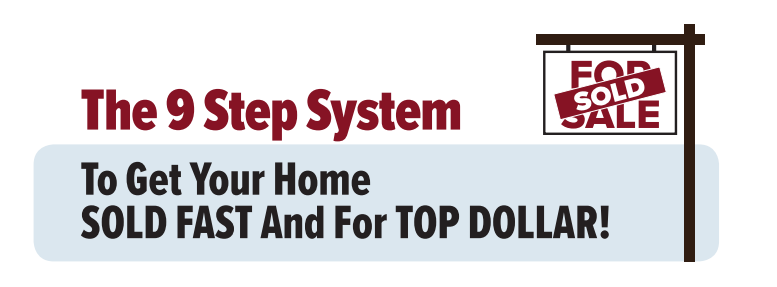
The Real Estate Market Has Changed...
Remember not so long ago, when you could make your fortune in real estate. It was
nothing then to buy a home, wait a short while, and then sell it at a tidy profit.
And then do it all over again.
Well, as you probably know, times have changed. As good as the market is right now,
home prices are still below what they were at their peak. Buyers are far more discrimi-
nating, and a large percentage of the homes listed for sale never sell. It’s more critical
than ever to learn what you need to know to avoid costly seller mistakes in order to sell
your home fast and for the most amount of money.
The 7 Deadly Mistakes Most Homesellers Make
1. Failing to analyze why they are selling.
2. Not preparing their home for the buyer’s eye.
3. Pricing their homes incorrectly.
4. Selling too hard during showings.
5. Signing a long-term listing agreement without a written performance guarantee.
6. Making it difficult for buyers to get information on their homes.
7. Failing to obtain a pre-approved mortgage for one’s next home.
The 9 Step System to Get Your Home Sold Fast
and For Top Dollar
Selling your home is one of the most important steps in your life. This 9 step system will
give you the tools you need to maximize your profits, maintain control, and reduce the
stress that comes with the home-selling process:
1. Know why you’re selling, and keep it to yourself.
The reasons behind your decision to sell affect everything from setting a price to de-
ciding how much time and money to invest in getting your home ready for sale. What’s
more important to you: the money you walk away with, the length of time your property
is on the market or both? Different goals will dictate different strategies.
However, don’t reveal your motivation to anyone else or they may use it against you at
the negotiating table. When asked, simply say that your housing needs have changed.
2. Do your homework before setting a price.
Settling on an offering price shouldn’t be done lightly. Once you’ve set your price, you’ve
told buyers the absolute maximum they have to pay for your home, but pricing too high
is as dangerous as pricing too low. Remember that the average buyer is looking at 15-20
homes at the same time they are considering yours. This means that they have a basis
of comparison, and if your home doesn’t compare favorably with others in the price
range you've set, you won’t be taken seriously by prospects or agents. As a result, your
home will sit on the market for a long time and, knowing this, new buyers on the market
will think there must be something wrong with your home.
3. More homework.
(In fact, your agent should do this for you). Find out what homes in your own and similar
neighborhoods have sold for in the past 6-12 months, and research what current homes
are listed for. That’s certainly how prospective buyers will assess the worth of your home.
4. Find a good real estate agent to represent your needs.
Nearly three-quarters of homeowners claim that they wouldn’t use the same realtor who
sold their last home. Dissatisfaction boils down to poor communication which results in not
enough feedback, lower pricing and strained relations.
5. Maximize your home’s sales potential.
Each year, corporate North America spends billions on product and packaging design. App-
earance is critical, and it would be foolish to ignore this when selling your home. You may
not be able to change your home’s location or floor plan, but you can do a lot to improve
its appearance. The look and feel of your home generates a greater emotional response
than any other factor. Before showings clean like you’ve never cleaned before. Pick up,
straighten, unclutter, scrub, scour and dust. Fix everything, no matter how insignificant it
may appear. Present your home to get a “WOW” response from prospective buyers.
Allow the buyers to imagine themselves living in your home The decision to buy a home
is based on emotion, not logic. Prospective buyers want to try on your home just like
they would a new suit of clothes. If you follow them around pointing out improvements
or if your decor is so different that it’s difficult for a buyer to strip it away in his or her
mind, you make it difficult for them to feel comfortable enough to imagine themselves
an owner.
6. Make it easy for prospects to get information on your home.
You may be surprised to know that some marketing tools that most agents use to sell
homes (eg. traditional open houses) are actually not very effective. In fact only 1% of
homes are sold at an open house.
Furthermore, the prospects calling for information on your home value their time as
much as you do. The last thing they want to be subjected to is either a game of tele-
phone tag with an agent, or an unwanted sales pitch. Make sure the ads your agent
places for your home are attached to a 24 hour prerecorded hotline with a specific ID#
for your home which gives buyers access to detailed information about your property
day or night, 7 days a week, without having to talk to anyone. It’s been proven that 3
times as many buyers call for information on your home under this system. And remem-
ber, the more buyers you have competing for your home the better, because it sets up
an auction-like atmosphere that puts you in the driver’s seat.
7. Know your buyer.
In the negotiation process, your objective is to control the pace and set the duration.
What is your buyer’s motivation? Does s/he need to move quickly? Does s/he have
enough money to pay you your asking price? Knowing this information gives you the
upper hand in the negotiation because you know how far you can push to get what you
want.
8. Make sure the contract is complete.
For your part as a seller, make sure you disclose everything. Smart sellers proactively
go above and beyond legal requirements to disclose all known defects to their buyers
in writing. If the buyer knows about a problem, s/he can’t come back with a lawsuit lat-
er on. Make sure all terms, costs and responsibilities are spelled out in the contract of
sale, and resist the temptation to diverge from the contract. For example, if the buyer
requests a move-in prior to closing, just say no. Now is not the time to take any chances
of the deal falling through.
9. Don’t move out before you sell.
Studies have shown that it is more difficult to sell a home that is vacant because it looks
forlorn, forgotten, simply not appealing. It could even cost you thousands. If you move,
you're also telling buyers that you have a new home and are probably highly motivated
to sell fast. This, of course, will give them the advantage at the negotiating table.
Not intended to solicit property currently listed for sale. Copyright© Craig Proctor Productions 2017


